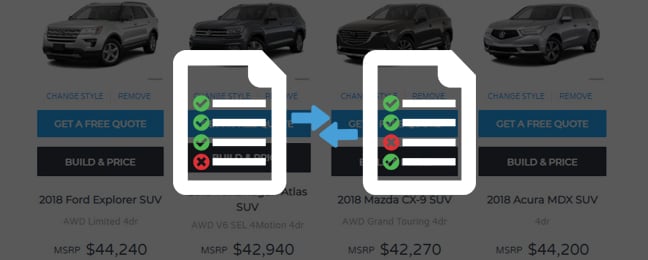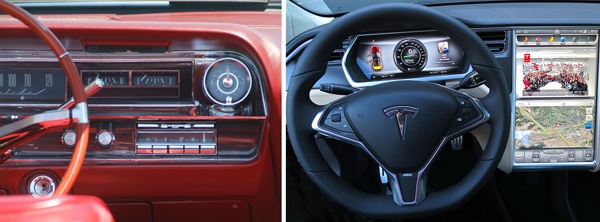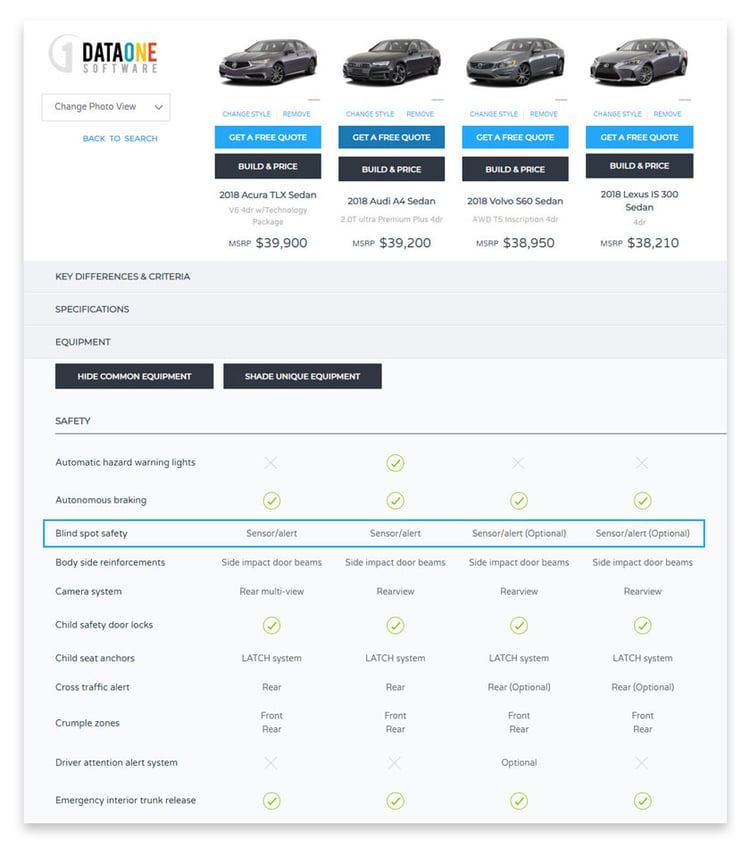

Apr 10 2017
85-90% of auto shoppers conduct online research, according to a MillwardBrown study. And 64% of online vehicle shoppers compare different models as part of the process, according to a recent study commissioned by Cox Automotive. Still many auto listing and dealership websites do not offer a comparison
More than half of your site visitors, or potential customers, expect to compare vehicles. So, whether you are an auto listing site, 3rd party research site, or dealership, it’s essential that you provide an intuitive vehicle comparison tool with the capability to compare models and trims as part of your online shopping experience.
Here are some specific reasons why vehicle comparison is particularly valuable to today’s online vehicle shoppers.
Each model year, vehicles are becoming more complex with advanced safety technology, connectivity features, better fuel efficiency, and more bells and whistles. This means that comparing vehicle models, and even

Here are some popular comparison points that should be included:
These vehicle details and specs should also be utilized for search filtering on vehicle overview and detail pages.
OEMs are fiercely competing for market share with similarly classed vehicles. With such a high demand for retaining their current market share, manufacturers are pushing out new vehicle model designs more frequently and prices are more competitive than ever. Consumers are benefitting from this vehicle market, but are challenged when it comes to comparing vehicles. It's hard for shoppers to pick a clear winner with several OEMs offering attractive/fully loaded vehicles in the same classes.
As a result of a highly competitive vehicle market, consumers tend to not have as much loyalty to one particular brand. In the same Cox Automotive study mentioned above, survey results showed that only 14% of vehicle shoppers knew which make they wanted at the beginning of their shopping process. 86% of vehicle shoppers are open to different makes!
A vehicle comparison tool is valuable for these undecided vehicle shoppers who don't have a preference on their next vehicle and are researching by vehicle type, price range, and features. Additionally, offering a comparison tool that suggests which models your users should compare based on features they’ve identified as important is a great way to increase engagement. Traditional comparison tools require that shoppers have some models in mind in order to compare.
Cross-shopping is a real problem for dealers and classified auto listing sites. According to a study from Google a few years back, "72% of search sessions involve cross-shopping." If vehicle shoppers cannot easily navigate your inventory, filter search results by a number of different criteria, and then compare some of the best matching results down to the different trim options, they'll move right on to the next site. There are plenty of Classified auto listing, dealership, and vehicle research websites to choose from, so make sure your site offers
It can get confusing attempting to distinguish the difference between vehicle features when they all have different OEM marketing names. For example, Honda and Subaru both offer safety technology to increase blind-spot visibility, but Honda's version is named LaneWatch™ while Subaru's is named Blind-spot Detection and Rear Cross-Traffic Alert. Without additional research, the average vehicle shopper wouldn't know that these two safety features essentially accomplish the same goal with slight nuances in functionality.
Fortunately, most vehicle data providers will not only account for all the OEM vehicle features in their comparison tools but will normalize the data for consumers to easily digest when comparing different models. Here's an example from DataOne's comparison tool where these vehicle safety feature descriptions are normalized for the consumer:

There's a good chance that many of your competitors have not included a vehicle comparison tool on their vehicle overview pages or vehicle detail pages (VDP). Since the vehicle shopping process has become so complicated, consumers will latch on to websites that make it easy to find their top choices and then compare them side-by-side. Offering a comparison tool would be especially valuable to mobile users who cannot conveniently compare multiple VDPs or website simultaneously.
Many comparison tools are able to keep track of which vehicles are selected by vehicle shoppers and use this consumer data for marketing intelligence. Here's a great example from AutoWeb, a vehicle research site, where their comparison feature can provide a lot of insight for dealers:
![]()
As you can see, AutoWeb has saved the vehicles I had originally selected to compare even though I had left the site and revisited on a different day. In this scenario, AutoWeb tracks user activity with web browser cookies.
Dealers can utilize this information to create vehicle-specific email messaging for those who have submitted their email, and targeted remarketing ads with specific inventory for all previously engaged visitors that did not submit a lead.
The process of researching vehicles can be time-consuming without the right tools for the job. Providing a vehicle comparison tool as part of your solution allows consumers to efficiently and effectively weigh the pros and cons of their vehicles of interest. If your inventory listings are user-friendly, consumers with engage on your website and take that next logical step, whether it's to build their perfect vehicle, request a quote, call your dealership, or schedule a test drive.
Photo Credits: Doc Searls, Wikipedia